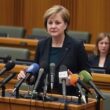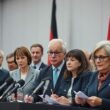Germany’s Foreign Minister, Johann Wadephul, is embarking on his inaugural visit to China next Sunday, accompanied by a delegation of six prominent business leaders. The trip, revealed in Wednesday’s edition of the Handelsblatt, underscores the increasingly complex and strained relationship between Berlin and Beijing amidst mounting economic pressures on German industries.
The delegation’s composition signals a deliberate focus on the concerns of medium-sized enterprises, which form the backbone of the German economy. Represented are key figures including Hildegard Müller, President of the German Association of the Automotive Industry (VDA); Helmut Schmid from the German Robotics Association; Elisabeth Staudinger, a board member of Siemens Healthineers; Georg Weber, Technical Director at machinery manufacturer Wilo; Andreas Kroll, CEO of Noble Elements, a crucial importer of technology metals and rare earth elements; and Cathrina Claas-Mühlhäuser, Deputy Chair of the Asia-Pacific Committee of the German Chamber of Commerce.
Wadephul’s itinerary includes political discussions in Beijing on Monday, followed by a continuation to Guangzhou. The timing of the visit is significant, occurring against a backdrop of significantly deteriorated Sino-German relations. European businesses, including numerous German companies, have been grappling with increasingly restrictive export controls on rare earth elements for months. These controls, effectively implemented as de facto delivery stoppages, have severely disrupted supply chains and raised alarms within critical industrial sectors.
While the German government publicly emphasizes the importance of maintaining economic ties with China, the inclusion of representatives from industries like robotics, automotive and particularly those reliant on rare earth elements, points to a specific agenda. Experts suggest Wadephul’s visit will likely involve direct engagement with Chinese officials aiming to secure a relaxation of existing export controls and ensure continued access to crucial raw materials. However, critics argue that such a commercially-driven agenda risks overshadowing broader concerns regarding human rights, political freedoms and China’s geopolitical ambitions. The visit’s success hinges on balancing these competing priorities and navigating an increasingly nuanced and challenging diplomatic landscape.





